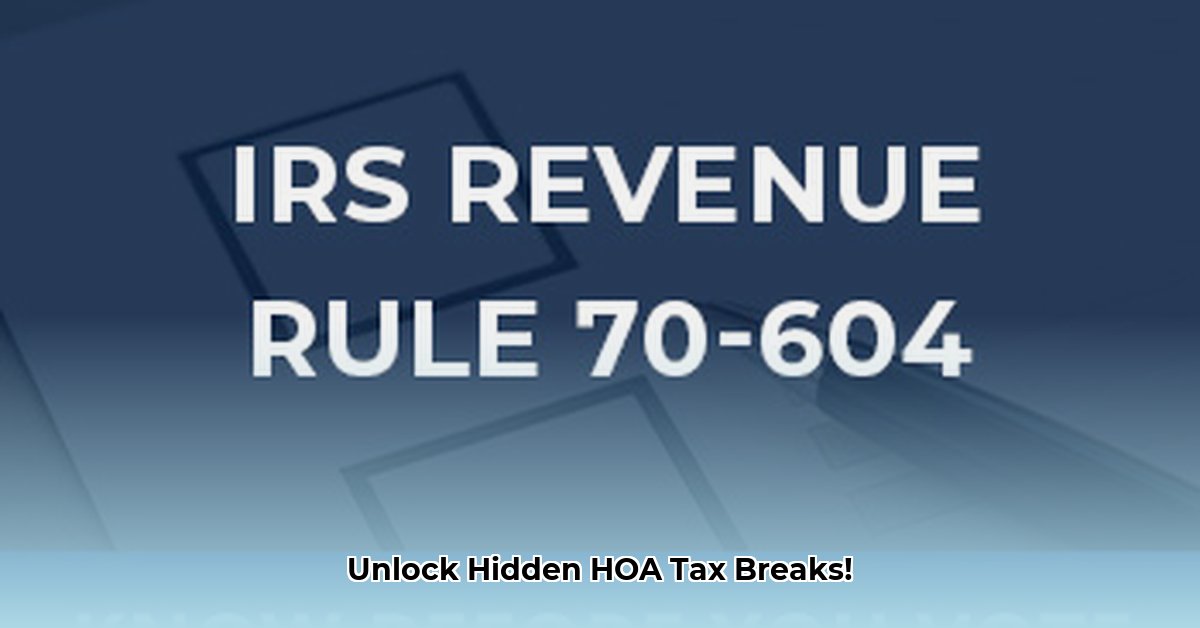
This guide provides a practical, step-by-step approach to understanding and utilizing IRS Revenue Ruling 70-604 to potentially reduce your Homeowners Association's (HOA) tax liability. We'll address common ambiguities and offer risk mitigation strategies to ensure compliance.
Understanding Revenue Ruling 70-604: A Simplified Explanation
IRS Revenue Ruling 70-604 offers HOAs (filing Form 1120) a way to potentially lower their tax bill by deferring or refunding excess income. This isn't a guaranteed tax break; it requires careful planning. The ruling allows for a one-year carryover of excess funds, but it's crucial to understand the precise conditions and limitations. Misinterpretations frequently lead to IRS audits. This makes expert guidance essential.
Key Considerations and Potential Pitfalls
Before diving into the implementation steps, let's address some common points of confusion surrounding Revenue Ruling 70-604:
The Election Process: Determining who officially elects to utilize the ruling – the HOA board or the individual homeowners – is frequently debated. The correct approach depends heavily on your HOA's governing documents, state laws, and potentially legal interpretations. There's no single answer.
The "Stockholder-Owner" Definition: This term, crucial to the application of the ruling, lacks a universally accepted definition. Its interpretation is highly dependent on your HOA's specific legal structure and state legislation. Ambiguity here can lead to non-compliance and penalties.
The One-Year Limitation: The one-year carryover provision is not an indefinite tax deferral. Failing to understand and comply with this limitation can result in significant tax liabilities.
A Step-by-Step Guide to Implementing Revenue Ruling 70-604
Successfully utilizing Revenue Ruling 70-604 hinges on meticulous planning and thorough record-keeping. Follow these steps:
1. Formal Election: Document your HOA's decision to utilize Revenue Ruling 70-604 formally. This requires clear, written documentation, such as meeting minutes, board resolutions, and emails, clearly outlining the decision-making process. This creates an auditable trail.
2. Expert Consultation: Seek professional guidance from a tax advisor specializing in HOAs. They can navigate the ruling's complexities, considering your HOA's specific structure, and ensure full compliance with state and federal regulations. Proactive advice saves significant costs in the long run.
3. Meticulous Record-Keeping: Maintaining detailed records of all financial transactions related to Revenue Ruling 70-604 is paramount. This includes communications, correspondence, and supporting documentation. This level of organization is critical for demonstrating compliance during an audit.
4. Annual Review and Updates: Tax laws and their interpretations evolve. Schedule an annual review of your procedures to ensure continued compliance and adaptation to changes. Regular review reduces the risk of unintentional non-compliance.
Risk Mitigation Strategies: Avoiding Common Mistakes
Non-compliance with Revenue Ruling 70-604 can result in substantial penalties. Proactive risk mitigation is essential:
| Potential Problem | Mitigation Strategy |
|---|---|
| Misapplication of Revenue Ruling 70-604 | Engage a qualified tax advisor; maintain thorough and accurate documentation. |
| Uncertain "Stockholder-Owner" Status | Seek legal counsel for clarification tailored to your HOA's structure and location. |
| IRS Audit | Maintain impeccable records; proactively seek professional advice; ensure full compliance. |
| Misunderstanding the One-Year Rule | Precise accounting; consult with your tax advisor for clarification and confirmation. |
Key Takeaways: Maximizing the Benefits of Revenue Ruling 70-604
Revenue Ruling 70-604 offers potential tax savings, but requires expertise and careful planning. The key to successful implementation is:
- Professional guidance: A tax professional specializing in HOAs is essential.
- Comprehensive documentation: Meticulous record-keeping is crucial for audit defense.
- Proactive compliance: Annual reviews and updates ensure continued adherence to regulations.
- Understanding limitations: The one-year carryover rule and the ambiguity around "stockholder-owners" requires professional interpretation.
By following these guidelines and seeking expert advice, your HOA can confidently utilize Revenue Ruling 70-604 to potentially reduce its tax burden while maintaining full compliance with IRS regulations. Remember – proactive compliance is the most effective and cost-efficient approach.